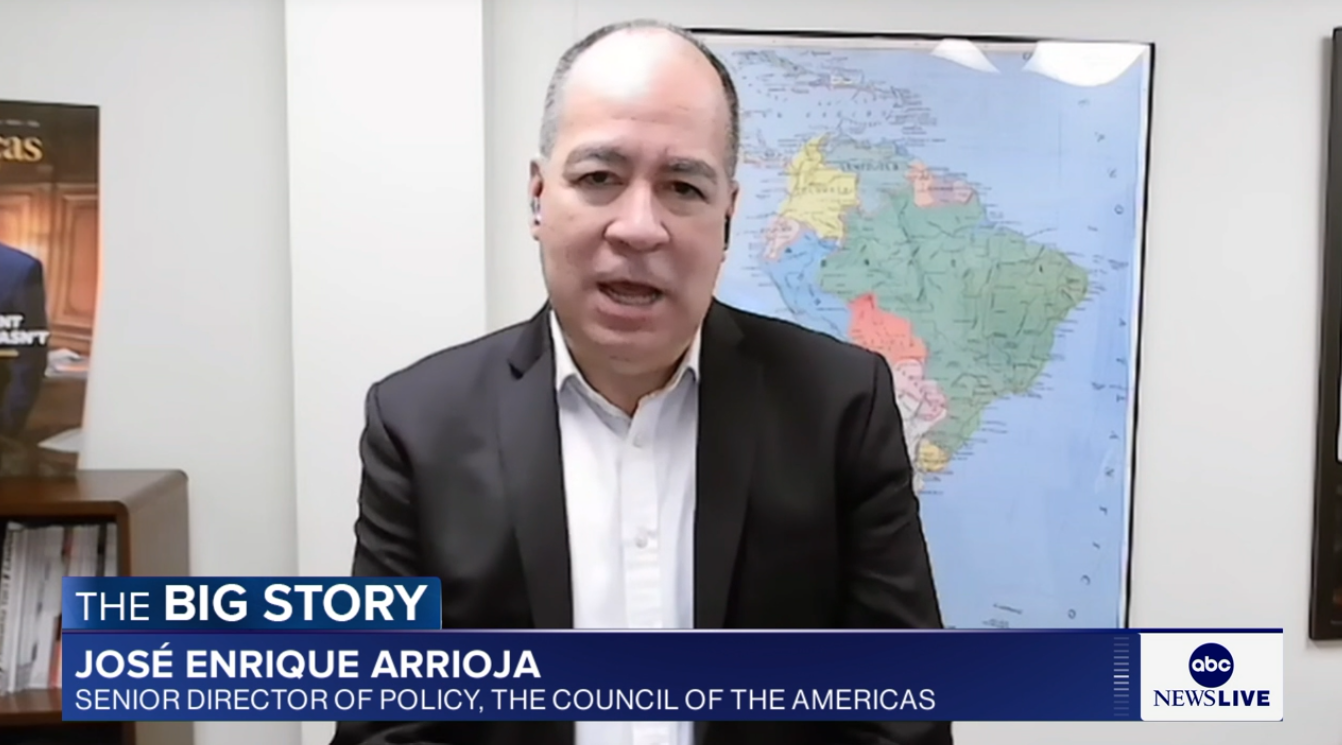Reactions to Obama’s Win: Taking the Pulse in Brazil, Colombia, Mexico, and Venezuela
Reactions to Obama’s Win: Taking the Pulse in Brazil, Colombia, Mexico, and Venezuela
In Brazil, Colombia, and Mexico, some supported the U.S. president’s win with the hope of a more engaged administration, while others in Venezuela saw little possibility for new policies.
Following U.S. President Barack Obama’s reelection on November 6, some Latin Americans celebrated the win, though analysts cautioned that his administration should make the region a higher priority. Here is a selection of reactions in four countries in Latin America: Brazil, Colombia, Mexico, and Venezuela.
Brazil: The local press gave widespread election coverage to Obama’s victory, as the president enjoys enormous popularity in Brazil. The New York Times noted that some in Brazil welcomed the reelection with “relief.” A Rio de Janeiro salesman told the Times: “Everything that happens in the United States influences every other country, in both positive and negative ways. It’s as though someone threw a pebble in the water and you sit waiting for the ripples to come out your way.” “Parabéns Obama” (Congratulations Obama) trended worldwide on Wednesday as Brazilians celebrated Obama’s victory on Twitter.
However, some warned that Obama’s reelection may mean little changes to his Brazil policy. Agencia Brasil interviewed two political scientists who contend that Obama’s priorities do not include Brazil or Latin America. They said Obama is likely to continue his current Latin American policies, and to focus on the region’s stability and economic growth. The BBC analyzed what Obama’s win means for Brazil, indicating that there’s room for closer relations. But Rubens Barbosa, a former Brazilian ambassador to the United States, said: “[The win] doesn’t mean anything, because the relationship is basically in the economic and trade areas, and the Republican and Democratic platforms don’t differ in these areas.”
The election outcome also drew comments on what should come next in terms of bilateral trade policy. “In the case of Brazil, the most important thing is to defeat protectionism,” said Bruno Borges, an international relations analyst.
Colombia: Colombian press highlighted the importance of the Latino vote in assuring Obama’s reelection, and several leaders expressed support for the president. President Juan Manuel Santos congratulated Obama on his win, saying it was “good news” to strengthen the bilateral relationship through the recently implemented free-trade agreement, fighting drug-trafficking and organized crime, and promoting social development. Vice President Angelino Garzón said he viewed the win as “positive” but cautioned that Latin Americans expect more from Obama during his next administration, including immigration reform. “Colombian immigrants have rights that must be respected…among them the right to American residency,” he said. Interior Minister Fernando Carillo said the government supports Obama’s reelection and his “fantastic” backing for Colombia’s peace process. “Having a new president on our side is fundamental. Peace in Colombia is a global phenomenon,” he noted. Caracol Radio featured an interview with Peter Michael McKinley, the U.S. ambassador to Colombia, who said Obama’s win would bring the U.S.-Colombia relationship to “another level.”
But an article in El Tiempo argues that Obama is unlikely to make policy changes toward Colombia. Political scientist Laura Gil said that while Obama will be helpful in his support of the peace process, he won’t take a leadership role, since the talks “are not on his radar.” She explained that in terms of U.S. policy, Colombia and Latin America “won’t be a priority” and the region shouldn’t expect changes.
Mexico: GlobalPost reported that many Mexicans “breathed a sigh of relief” when they learned of Obama’s reelection. The local media headlined Obama’s victory; Milenio’s website featured a large banner with “Four more years” written across it, while El Universal ran an image of the U.S. president saying “The world asks Obama to drive the economy.”
Several Mexican congressmen weighed in on Obama’s victory; Javier Lozano, senator from the governing National Action Party, said via Twitter that it was “good news” for Mexico. In its online debate forum, Mexican news site Animal Político asked policy analysts and officials what an Obama victory means for the United States and Mexico. Institutional Revolutionary Party Deputy Javier Treviño said that, in terms of Washington’s Mexico policy, the Obama administration’s second term would likely be marked by a continuation of priorities important to the United States, “including a central focus on security cooperation.”
Mexican public opinion polls showed mixed marks for Obama. A BGC-Excelsior survey released this week found that while 58 percent of Mexicans supported his reelection, over 70 percent felt that Obama has not done enough to help undocumented immigrants, fight the drug cartels, or increase bilateral trade.
In a November 6 Excelsior op-ed, Armando Román Zozaya wrote that Mexico should be a bigger priority in the United States regardless of who wins, and said: “Despite his defects, Obama would be a president more likely to put our interests on the U.S. agenda.”
Venezuela: The state-run media received the news of Obama’s win with little fanfare, while opposition TV network Globovisión and newspaper El Universal highlighted the role of the Latino vote. The day before the election, President Hugo Chávez said he had “little hope” that either candidate would bring changes to the U.S. relationship with Venezuela and Latin America. Chávez also said that his “endorsement” of Obama had no impact on the election.
Some Venezuelans also expressed doubt that Obama’s reelection would alter U.S.-Venezuelan relations. “Whether a Democrat or Republican wins, the economic relationship of dependency that both countries have won’t change. With Obama staying in the White House, there will be a relative political rapprochement and mutual respect,” wrote Alfonso Hernández Ortíz in a November 7 Noticias Al Día op-ed. In addition, analysts told El Nuevo Herald that Obama is likely to maintain a policy of “cold coexistence” with Venezuela. Luis Lauredo, former U.S. ambassador to the Organization of American States, said the Obama administration had worked to integrate parts of Latin America, but left out Ecuador and Venezuela—countries on “the fringes of reality.”
- On November 6, Puerto Ricans voted in favor for the first time of becoming a U.S. state in a referendum, though the decision ultimately falls to Congress and the president. In a first question on whether to change the current status from a U.S. commonwealth, 54 percent voted yes. A second question asked what form the change should take; asked which alternative Puerto Ricans prefer, 61 percent chose statehood, 33 percent picked “sovereign free associated state,” and 6 percent favored independence. However, only two-thirds of voters who answered the first ballot question chose to answer the second, so the statehood choice failed to reach a majority. In addition, Governor Luis Fortuño lost reelection to Popular Democratic Party candidate Alejandro Garcia Padilla.
- A record number of Latinos voted for President Barack Obama: 75 percent, according to LatinoDecisions. Obama received the majority of Hispanic votes in key swing states: 87 percent in Colorado, 82 percent in Ohio, and 66 percent in Virginia.
- On Tuesday, Republican candidate Ted Cruz became the first Latino to win a Senate seat in Texas. Backed by the Tea Party, Cruz became the third Hispanic senator in Congress, joining Bob Menendez (D-NJ) and Marco Rubio (R-FL).








